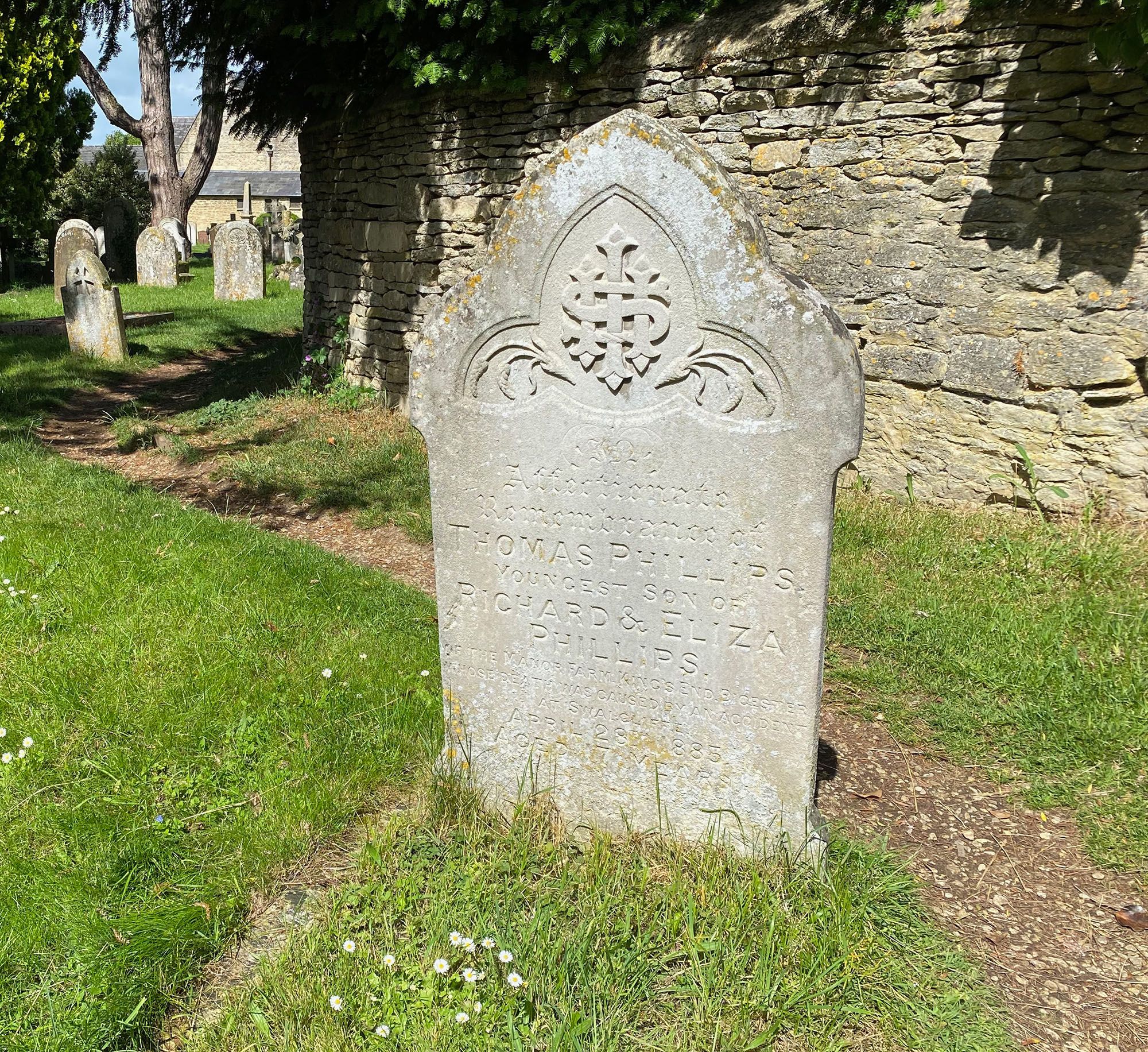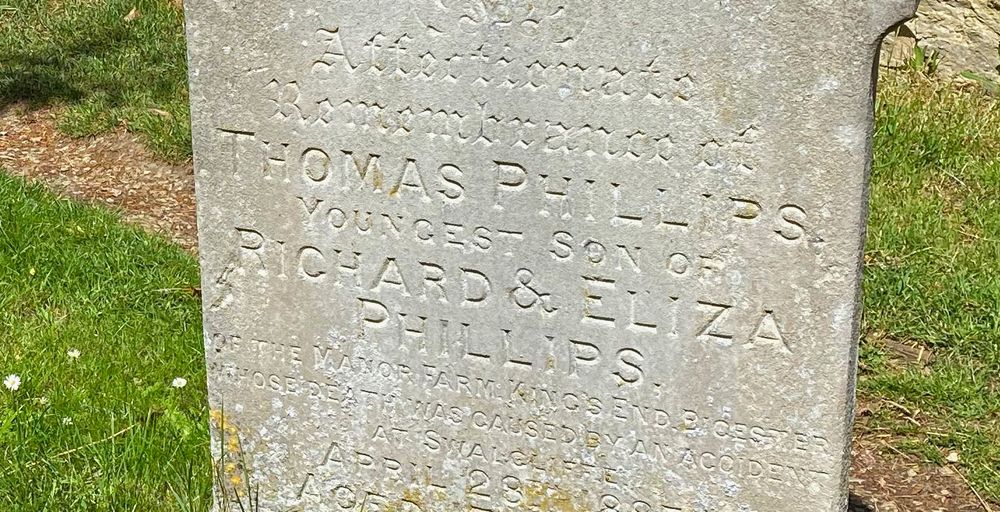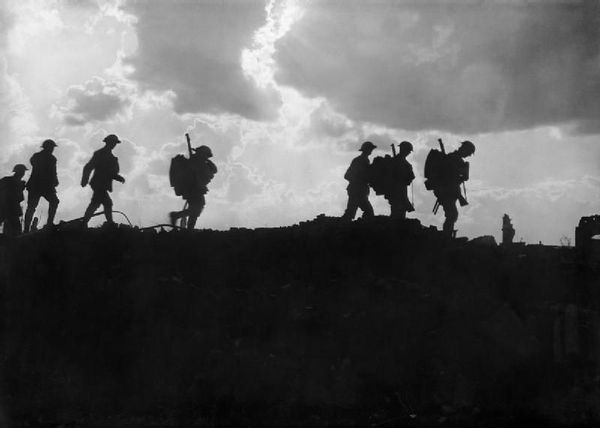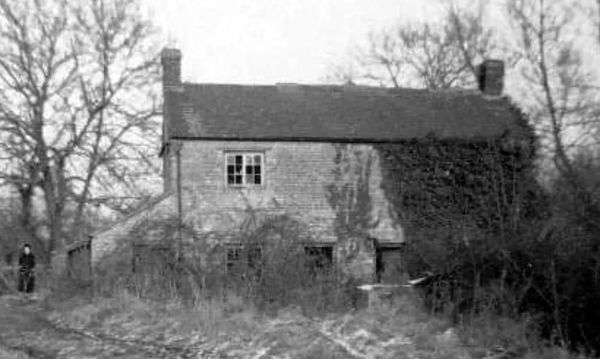The Fatal Accident of Thomas Phillips
Anyone who has taken the shortcut through the cemetery that runs along the side of the wall will have manoeuvred their way around the grave of Thomas Philips just as they rejoin the main path near the churchyard gate. It has an ornately carved headstone and, whilst some of the inscription has been worn away over the years, the word “accident” can still be clearly seen.

As the following two reports, published in the Bicester Herald, show, Thomas’s curiosity got the better of him, leading to his tragic end at such a young age. He was obviously well liked in the town and a respected member of the farming community that his family had been a part of for many years.
1st May 1885:
FATAL DISASTER AT SWALCLIFFE TO A FORMER RESIDENT AT BICESTER
On Wednesday evening last, April 28, an inquest was held on view of the body of Thomas Phillips, aged 17, the younger son of the late Mr Richard Phillips, farmer, formerly of the Manor Farm, King’s End, Bicester.
The body was identified by the brother of the deceased, who stated that he and the deceased were pupils of Mr G.H. Hall, at the Rectory Farm, Swalcliffe. He was with the deceased on the previous morning, and left him all right; but on his return to the house for dinner at 12 o'clock, he found that he was in bed suffering from considerable injuries, which were being attended to by Mr Routh, of Sibford. Deceased died that night. He was told that he had met with an accident amongst the bells in Swalcliffe church tower.
John Green, a mason, on examination stated that he knew the deceased very well, and was in the belfry of Swalcliffe church to ring the bell for a death (as he was the son of the sexton) at eleven o'clock on Tuesday morning. The deceased came up to the belfry, and said that he was going up to the top of the tower. There was no one else there. Deceased left and went up the steps, and he saw no more of him. Then the bell stopped, and he found there was something the matter, and ran down to fetch his uncle, Joseph Green, from the stone pit, who then told him to fetch his brother, Frederick Green, which he did.
They and several others went up into the belfry, and they found the deceased under the big bell, which he had been ringing. The deceased was alive, and had not been meddled with. He stood on the bell to push it on one side for his brothers, Fred and Tom, to get the deceased out, which they did, and carried him down to the next landing, to which Mr Routh, the doctor, came in a few minutes, as his uncle had fetched him from the vicarage.
Thomas Green testified: I heard the Swalcliffe big bell ringing yesterday morning at eleven o'clock, and when it had stopped I saw the last witness and their uncle Joseph. They asked me to go up into the tower with them as they thought Phillips, meaning the deceased, was hurt. I went up and found the deceased on his back under the big bell. No one else was there. As soon as I got to him Philip said “Pull me out, please." I came back down the steps and several others were coming up, and I said to them “Come up quiet for Thomas Phillips is nearly dead." When we got back to the bell I went down to him, and he said to me that both his arms were broken and his legs.
We got the deceased up from under the bell, took him to the top of the ladder, and put him down onto the floor. Deceased then said to me that he had slipped, which I understood that he slipped into the bell. The deceased was on his back when I found him, and the clapper of the bell was on his stomach. He was on a boarded floor. The deceased could not have got into the position in which I found him unless he had tumbled into the bell whilst it was up. If he had slipped on one side he would have been cut all to pieces. We removed him to Mr Hall’s house.
Mr Richard Laycock Routh, surgeon, Sibford, deposed: Yesterday morning when called I found the deceased, as stated by the last witness, just taken out from the belfry. I found him conscious. He bled a great deal from some cuts on his head, and he told me his arms and legs were broken.
I examine the deceased at Mr Hall's office. He was undressed. I carefully examined the body, but neither the legs nor arms were broken or injured beyond bruises, but all feeling in them was gone. In fact he was paralysed, and on examining the deceased’s back I found that at least one of the vertebrae was broken, and the paralysis was due to the pressure of the displaced bone on the spinal cord. There was no hope of the deceased’s recovery when I first examined him. I saw him several times afterwards. The actual cause of the death was paralysis, caused by the fracture of the spine. The deceased told me that he had slipped off one of the beams in the belfry.
The jury, of whom Henry Norris Esq., of Swalcliffe Park, was foreman, returned a verdict that the deceased met with his death from paralysis from fracture of the spine, caused by the deceased having accidentally fallen into the great bell in Swalcliffe Church belfry, whilst it was being rung on Tuesday the 28th April.
The funeral of the deceased is to take place in the cemetery at Bicester, on Saturday next, May 2. Deceased’s mother died some months ago, leaving the two sons referred to above.
8th May 1885:
THE FATAL DISASTER TO MR THOMAS PHILLIPS
This sad event was referred to in last week’s Herald. The following account contains additional information on the subject. The writer says: A fatality of an extraordinary character occurred at Swalcliffe on Tuesday, April 28. The church bell was proclaiming the departure of a soul, when, curious to see the bell in motion, and little thinking that it's solemn knell was to be the sealing of his own death warrant, Mr Thomas Phillips, a youth of 17, son of the late Mr Richard Phillips, of Bicester, and farm pupil of Mr George Hall, of Swalcliffe, ascended to the belfry. But a few moments later the toller was alarmed by the bell refusing to respond to his efforts, and, fearing that something was seriously wrong, immediately rushed off for assistance.
Upon ascending to the belfry it was discovered that the poor young fellow had fallen inside the ponderous bell, and, notwithstanding his most pathetic appeal “Pull me out, please." it was found impossible to extricate him for several minutes, as it required the united effort of six men to keep the bell in position whilst he was being removed.
Dr Routh, who fortunately happened to be in the village, was immediately on the spot, and later on Dr Raney, of Banbury, who had been summoned shortly after the accident. Both gentleman expressed their opinion that the unfortunate youth could not long survive his dreadful injuries, and death put an end to his sufferings within a few hours after the accident.
Owing to the condition of the deceased, it was impossible to gather further from him than that he had slipped, and it is surmised that whilst peering into the tolling bell, when mouth uppermost, his foot had slipped and he was precipitated into it, thrown beneath as it assumed a pendant position, and was crushed against a beam.
On the Saturday last the remains were removed from Swalcliffe for interment at Bicester, the hearse being followed to the boundry of the parish by Mr Hall, several friends and neighbours of the deceased, and the whole of farm employees. The sad accident cast and gloom over the whole village.
The mortal remains of the deceased were interred in Bicester Cemetery on Saturday last, May 2. The corpse was brought from Swalcliffe in a full dressed hearse to the King's Arms Hotel, and at about half past two they started for the burial ground. Along the line the procession passed, the blinds were drawn and shutters put up as a mark of respect to the deceased. The Rev. J.H. Moore met the corpse at the churchyard gate and commenced to read the burial service. There was a large congregation assembled at the sacred edifice. Having arrived at the church, another portion of the service was rendered in a solemn manner by the curate, who finished the service at the grave.
The mourners were Mr D. Phillips (brother of the deceased), Mr T. Phillips (Cheltenham), Mr May (Gravel Pitts Farm, Piddington), Mr John Brown (Oxford), Mr G.R. Castle, Mr C. Hall (Swalcliffe), Mr Salmons, and Mr R. Grimsley. The coffin was of oak, with brass furniture, and on the breastplate was the following inscription: "Thomas Phillips, born August 20, 1867, died April 28, 1885."
The deceased was lowered into a brick grave, made by Messrs. T. Grimsley and Co, builders, Bicester, and which was situated near the entrance to the cemetery from the churchyard. On the grave were placed nine wreaths and a cross of flowers, which included roses, pansies, daffodils, and lilies. The flowers were contributed by friends, including Mr George Hall, Miss Hall, Mr E.H. Norris, Messrs. T. and A. Bloxham, Mr and Mrs Page and Mr Tom Hathfield, Mr Darrell Phillips, Mr Brown, and Miss Annie McFadden.
Mr C. Windsor, of High Street, Banbury, was the undertaker.



